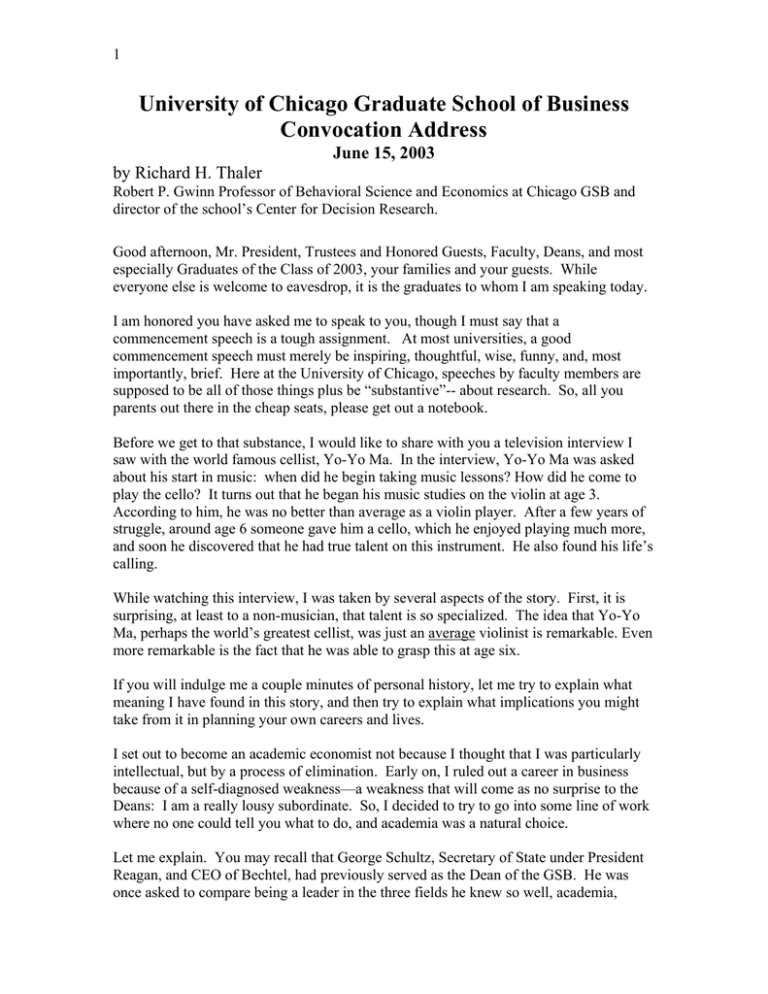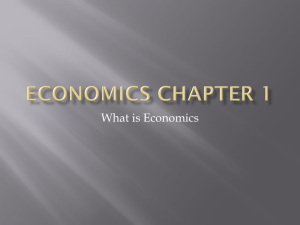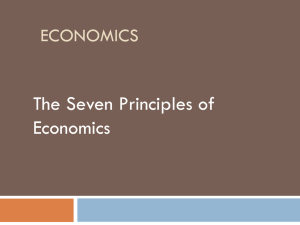University of Chicago Graduate School of Business Convocation Address June 15, 2003
advertisement

1 University of Chicago Graduate School of Business Convocation Address June 15, 2003 by Richard H. Thaler Robert P. Gwinn Professor of Behavioral Science and Economics at Chicago GSB and director of the school’s Center for Decision Research. Good afternoon, Mr. President, Trustees and Honored Guests, Faculty, Deans, and most especially Graduates of the Class of 2003, your families and your guests. While everyone else is welcome to eavesdrop, it is the graduates to whom I am speaking today. I am honored you have asked me to speak to you, though I must say that a commencement speech is a tough assignment. At most universities, a good commencement speech must merely be inspiring, thoughtful, wise, funny, and, most importantly, brief. Here at the University of Chicago, speeches by faculty members are supposed to be all of those things plus be “substantive”-- about research. So, all you parents out there in the cheap seats, please get out a notebook. Before we get to that substance, I would like to share with you a television interview I saw with the world famous cellist, Yo-Yo Ma. In the interview, Yo-Yo Ma was asked about his start in music: when did he begin taking music lessons? How did he come to play the cello? It turns out that he began his music studies on the violin at age 3. According to him, he was no better than average as a violin player. After a few years of struggle, around age 6 someone gave him a cello, which he enjoyed playing much more, and soon he discovered that he had true talent on this instrument. He also found his life’s calling. While watching this interview, I was taken by several aspects of the story. First, it is surprising, at least to a non-musician, that talent is so specialized. The idea that Yo-Yo Ma, perhaps the world’s greatest cellist, was just an average violinist is remarkable. Even more remarkable is the fact that he was able to grasp this at age six. If you will indulge me a couple minutes of personal history, let me try to explain what meaning I have found in this story, and then try to explain what implications you might take from it in planning your own careers and lives. I set out to become an academic economist not because I thought that I was particularly intellectual, but by a process of elimination. Early on, I ruled out a career in business because of a self-diagnosed weakness—a weakness that will come as no surprise to the Deans: I am a really lousy subordinate. So, I decided to try to go into some line of work where no one could tell you what to do, and academia was a natural choice. Let me explain. You may recall that George Schultz, Secretary of State under President Reagan, and CEO of Bechtel, had previously served as the Dean of the GSB. He was once asked to compare being a leader in the three fields he knew so well, academia, 2 government, and business. He replied that in business, if you asked someone to do something, they did it. In government, if you asked, it might happen. In academia, well, you don’t even bother to ask. So I studied economics, eventually received my Ph. D., and began to teach and do research. After a couple years I then came to another daunting observation. I realized that I was, at best, just an average economist. Lest you think I am just being modest, (a mistake that no one who knows me would make) my thesis advisor, Sherwin Rosen, when asked by The New York Times about my career as a student, revealed that “we didn’t expect much of him.” On top of that, I have to admit that I found economics to be, well, a bit boring. But there was something I did find interesting: people watching. People did not behave the way economic theory said they were supposed to. For example, one of my professors at the University of Rochester, Dick Rosett, who went on to become another Dean of the GSB, admitted that he had bottles of wine in his cellar that were now worth so much that he would never dream of buying a bottle at that price, but he was happy to drink these bottles, rather than sell them. I enjoyed making a list of these behaviors, and wrote a little paper about them. But what I really enjoyed was that my economist colleagues found these examples really annoying. Still, while I was having fun, I couldn’t figure out how I could make a living by annoying economists. At this point I made what I consider the greatest “discovery” of my intellectual career. I discovered two Israeli psychologists named Daniel Kahneman and Amos Tversky. Kahneman and Tversky were quite well known in psychology, but most economists had never heard of them, so in my world this counted as a discovery. Kahneman and Tversky offered me the key I needed; a way of studying these choice anomalies I had been so preoccupied by. They showed that most peoples’ choices differed in systematic ways from the rational choices assumed by economists. When I heard that they were going to spend a year visiting the U.S. at Stanford, I made it my business to be at Stanford too. I got to spend that year, 1977-78, hanging out with my idols, and half way through the year I decided, come what may, I was going to pursue the possibility of combining psychology with economics. I had found my cello. I was at this point 32 years old, a bit older than most of you graduates. Since I am standing here before you today, you can infer that my venture turned out okay, and you might be thinking that I now intend to glide into one of the standard commencement speech clichés. You know, the one that goes: if you work hard, you can accomplish anything. But as the students who have suffered though my managerial decision making class know, I am not inclined to offer that advice. Just the opposite, in 3 fact. I am always reminding my students to consider the cold, cruel odds, what psychologists call the “base-rate”. If you marry, your chances of avoiding divorce are only 50-50. And, for those starting new businesses, the odds are even worse. Don’t make bold forecasts, I stress. Remember the odds. So, what could I have been thinking when I set off to try to think up some new way of doing economics? Was I committing the same sort of irrational exuberance that I chide my students to avoid? I think not. When I set off on this journey, it was not with the expectation that I was bound to succeed, or even with the thought that I had a 50-50 chance. Still, I think my choice was rational for two reasons. First, my opportunity costs were not all that high. As I said, I was only an average economist with rather modest prospects. And second, I found this new enterprise to be great fun. Indeed, what can possibly be more fun than pointing out the warts on the naked emperor, while other members of your profession are busy describing the buttons on an imaginary three-piece suit? Now, you might ask, what is rational about choosing a career based on fun? I say that nothing could be more rational. I think of fun as the ultimate hedge. If you enjoy what you are doing, you establish a pretty good floor on how life turns out. In contrast, if you suffer through every stage of the process, can becoming rich or famous really be worth it? For most of us, even if we work really hard, we will never become as successful asYo-Yo Ma, Bill Gates, Michael Jordan, or even Gene Fama. But we can all find something we enjoy doing. Start with that. Well, it is now more than 25 years since I went off to Stanford to meet my idols, and one of them, Daniel Kahneman, who has since become my best friend, won the Nobel Prize in Economics. (Alas, Tversky died in 1996, or he would have shared the prize.) I guess you can say behavioral economics has become legitimate. And, economists are getting harder to annoy every year. So, I have been looking for new ways to have fun and different tunes to play on my cello. In collaboration with my good friend in the law school, Cass Sunstein, I have found another calling: annoying law professors! In my remaining time let me give you a glimpse into this new specialty, and provide the required substantive component of this speech. Cass and I have a paper coming out on the topic of Libertarian Paternalism. Now, you are probably thinking, isn’t libertarian paternalism an oxymoron, you know, like “behavioral economics”, “rap music”, or “compassionate conservative”? We argue that libertarian paternalism is not an oxymoron, and in fact we claim that it is a logical and attractive approach to public 4 policy. The idea behind libertarian paternalism is that organizations such as firms, universities, or governments can design policies that make it easier for people to do what is in their own best interest (that is the paternalistic part) and still leave everyone the option to choose for themselves (the libertarian part). One simple application of this idea is the selection of default options. A default option is simply the choice that people get if they do nothing. Lots of research shows that designating an option as the default makes it much more likely to be chosen. There are a host of behavioral reasons for this including laziness, absentmindedness, and the often misguided idea that the defaults have been chosen carefully. But the bottom line is that defaults matter. Take one example. In some countries, including the United States, in order to make your organs available to someone else if you happen to die in an accident you have to take some action, such as signing the back of your driver’s license. In many European countries, they have the opposite default option. You are presumed to give your consent unless you sign some form. The difference arising from this seemingly minor change is quite striking: in the US, fewer than 20 percent of drivers agree to make their organs available, whereas in the presumed consent counties, over 90 percent do. Thousands of lives are saved as a result; and no one’s freedom to choose has been usurped. I have used libertarian paternalism in my own attempt to contribute something to society beyond ulcers for economists. The problem I attacked was how to get people to save more in their 401(k) plans. In many companies, the 401(k) is the only pension plan, and many employees (especially those in the lower pay ranks) either fail to join, or contribute just a tiny portion of their salary. Simple calculations reveal that these workers will not have saved enough to enjoy a comfortable retirement. My solution to this problem is called Save More Tomorrow. Briefly, employees are invited to join a plan now in which their contributions to the 401(k) plan are automatically increased later, specifically, every time they get a raise. The increases in contributions are linked to raises because we know that people are particularly sensitive to cuts in their take-home pay. This plan has now been implemented in several companies. In the first company that tried it, saving rates have more than tripled. The company is happy, and so are the workers who joined the plan, very few of whom dropped out. This is both behavioral economics and libertarian paternalism in action! Well, as my students know, I end each lecture with some rules to live by. In that tradition, let me offer three more “rules”, ones I hope you might remember for a while. 5 1. You can help people, and society, by designing policies that make sensible choices easier to adopt, and you can do so while still leaving everyone free to choose. 2. Having fun in life is the best hedge against the inevitable downturns that will occur, and unlike most hedges, this one comes without the need to pay a commission to an investment banker. 3. It is never too late to find your own cello.



